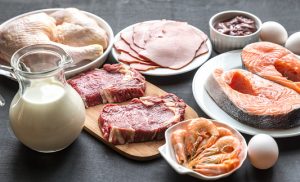
There’s nothing wrong with eating meat. It is a natural source of protein and important minerals. It is a great complement to a salad. It keeps you fuller for a longer time. It helps grow muscle mass and sustain healthy iron levels.
The problems start arising when we’re eating too much meat, multiple times a day, often choosing a cut with some fat. When meat is the only source of natural protein or even calories in our diet.
Heavy meat intake is bad for your liver
According to a recent study, people who regularly eat diet rich in animal protein are at a higher risk for non-alcoholic fatty liver disease (NAFLD). Characterized by excess fat buildup in the liver, the disease can progress into cirrhosis (permanent scarring of the organ), and even lead to life-threatening conditions such as liver malfunction and even cancer.
There has always been a connection between our diet and our liver health. After all, everything we ingest passes through the liver and, thus, can impact its wellbeing. Experts emphasize the importance of a healthy diet, but what does it really mean? And what can be a deal-breaker? The new research out of the Erasmus Medical Centre in Rotterdam, the Netherlands, uncovered that it’s our obsession with meat that leads us astray.
“The results from this study demonstrate that animal protein is associated with NAFLD in overweight elderly people,” said Louise Alferink, lead author of the study.
The study involved 3,440 people aged 71 years old on average. Thirty percent of the participants were lean, and 70 percent were overweight, based on their body mass index (BMI). The abdominal ultrasound revealed the presence of non-alcoholic fatty liver disease in 35 percent of people. The researchers used a 389-item food frequency questionnaire to assess the intake of macronutrients in their study subjects. Carbohydrate, protein, and fat are the three main types of macronutrients in our diet.
Based on ultrasound exams, questionnaire responses, and participants’ BMIs, researchers have identified strong links between macronutrients and the NAFLD diagnosis in mostly overweight participants. In particular, the results pointed to associations between total protein, mainly animal protein, and a higher risk of developing NAFLD.
How to eat less meat
If you’re used to rely on meat as your go-to ingredient for virtually any meal, it may be hard to start eating less meat all of a sudden. Do not fret, there are a few vegetarian options that you can use to keep your meals delicious, nutritious, and meatless:
- Tofu, the ultimate meat sub of all vegetarians
- Mushrooms will give you the same feeling of fullness without the actual meat involved
- Eggplants work great for sandwiches
- Lentils and beans are packed with plant-based protein and will make for a great meal
- Nuts, the perfect snack on the go
If you’re worried about your liver, you don’t have to eliminate all the meat completely. Leave it for one meal of the day, and go meatless for the other two meals. You’ll be amazed at how the extent of meatless culinary experimentation you can do, and your liver will thank you for it.